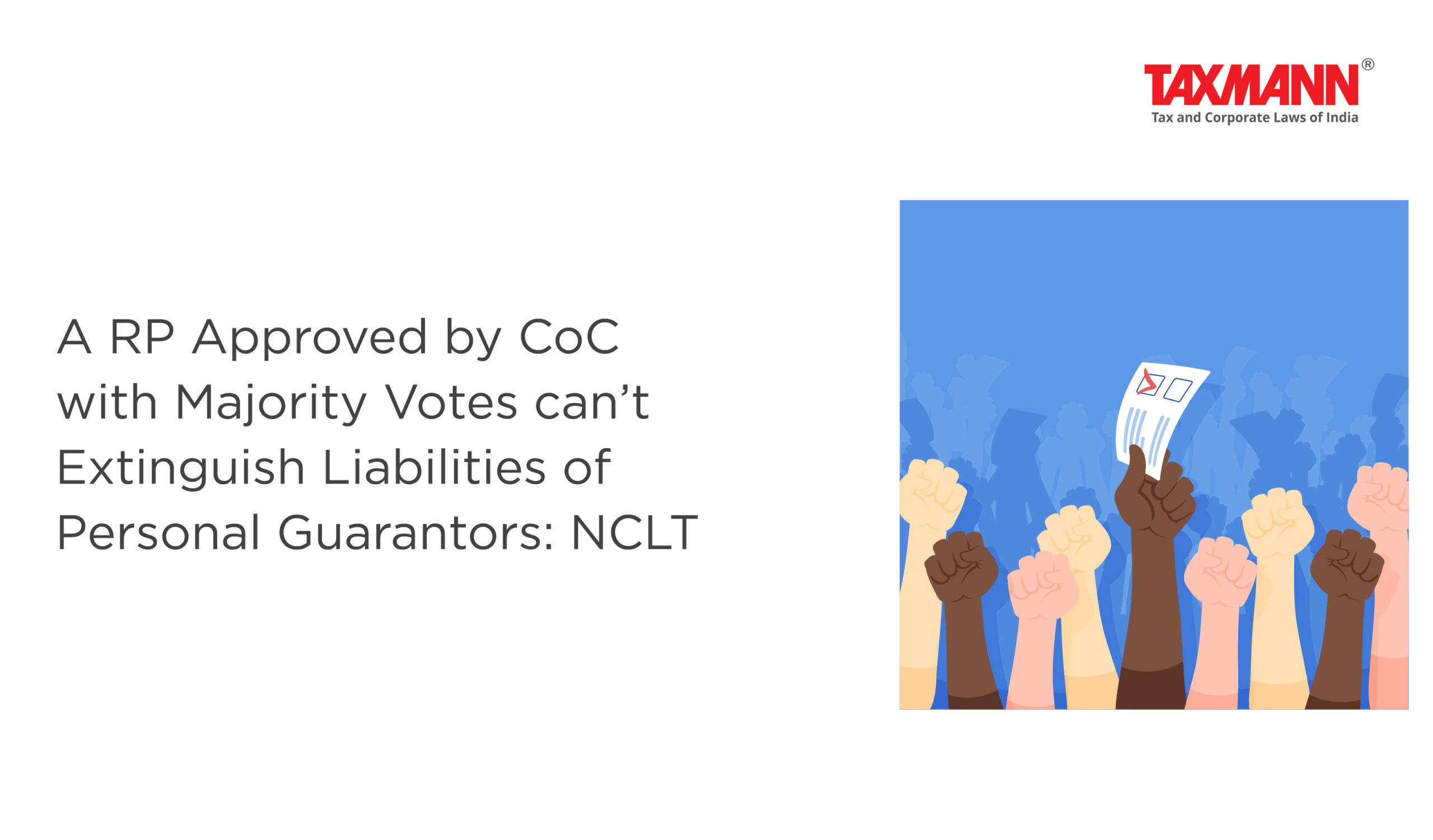A RP Approved by CoC with Majority Votes can’t Extinguish Liabilities of Personal Guarantors: NCLT
- Blog|News|Insolvency and Bankruptcy Code|
- 2 Min Read
- By Taxmann
- |
- Last Updated on 30 May, 2023

Case Details: Naveen Kumar Sood Resolution Professional of Ujaas Energy Ltd., In re, - [2023] 150 taxmann.com 242 (NCLT-Indore)
Judiciary and Counsel Details
-
- Dr Madan B. Gosavi, Judicial Member & Kaushalendra Kumar Singh, Technical Member
- Saurabh Soparkar, Sr. Counsel, Rohit Dubey & Ms Mily Ghoshal Ld. Counsels for the Applicant.
- Nipun Singhvi, Counsel for the Respondent.
Facts of the Case
In the instant case, the corporate debtor was admitted into the Corporate Insolvency Resolution Process (CIRP) by the Adjudicating Authority (NCLT). The IRP made a public announcement and received four resolution plans from prospective resolution applicants.
Consequently, the resolution plan submitted by the successful resolution applicant was approved by the Committee of Creditors (CoC) with majority votes and the same was submitted before the NCLT for approval under section 30(6) of the IBC.
The successful resolution applicant proposed a relatively higher amount, considering that all the secured creditors would agree to the proposal for the extinguishment of their rights on a personal guarantee.
However, the said resolution plan was objected to by a lender bank of the corporate debtor, who was a member of the CoC. A few other creditors also filed applications objecting to the resolution plan of the successful resolution applicant.
NCLT Held
The NCLT observed that the Committee of Creditors (CoC) could make any commercial decision relating to the insolvency of the corporate debtor. However, it could not extinguish the right of the dissenting creditor(s) to pursue legal action against the personal guarantor of the corporate debtor under the guise of exercising its commercial wisdom.
The NCLT held that such a provision in the resolution plan was not only prejudicial to the rights of creditors but also against the provisions of the law. Therefore, the resolution plan deserved to be rejected.
Disclaimer: The content/information published on the website is only for general information of the user and shall not be construed as legal advice. While the Taxmann has exercised reasonable efforts to ensure the veracity of information/content published, Taxmann shall be under no liability in any manner whatsoever for incorrect information, if any.

Taxmann Publications has a dedicated in-house Research & Editorial Team. This team consists of a team of Chartered Accountants, Company Secretaries, and Lawyers. This team works under the guidance and supervision of editor-in-chief Mr Rakesh Bhargava.
The Research and Editorial Team is responsible for developing reliable and accurate content for the readers. The team follows the six-sigma approach to achieve the benchmark of zero error in its publications and research platforms. The team ensures that the following publication guidelines are thoroughly followed while developing the content:
- The statutory material is obtained only from the authorized and reliable sources
- All the latest developments in the judicial and legislative fields are covered
- Prepare the analytical write-ups on current, controversial, and important issues to help the readers to understand the concept and its implications
- Every content published by Taxmann is complete, accurate and lucid
- All evidence-based statements are supported with proper reference to Section, Circular No., Notification No. or citations
- The golden rules of grammar, style and consistency are thoroughly followed
- Font and size that’s easy to read and remain consistent across all imprint and digital publications are applied



 CA | CS | CMA
CA | CS | CMA
